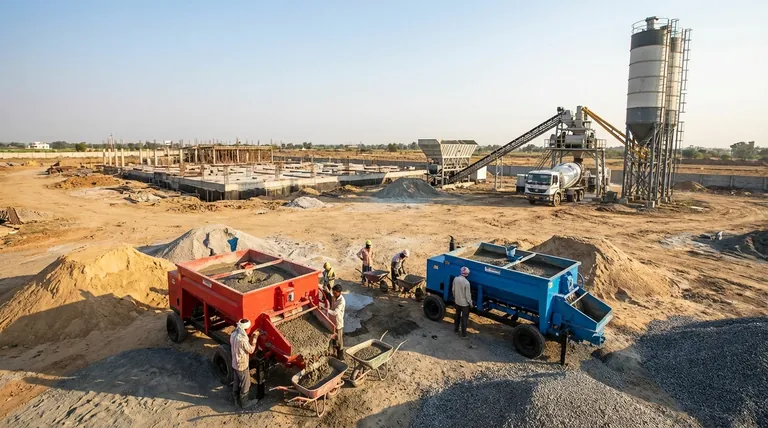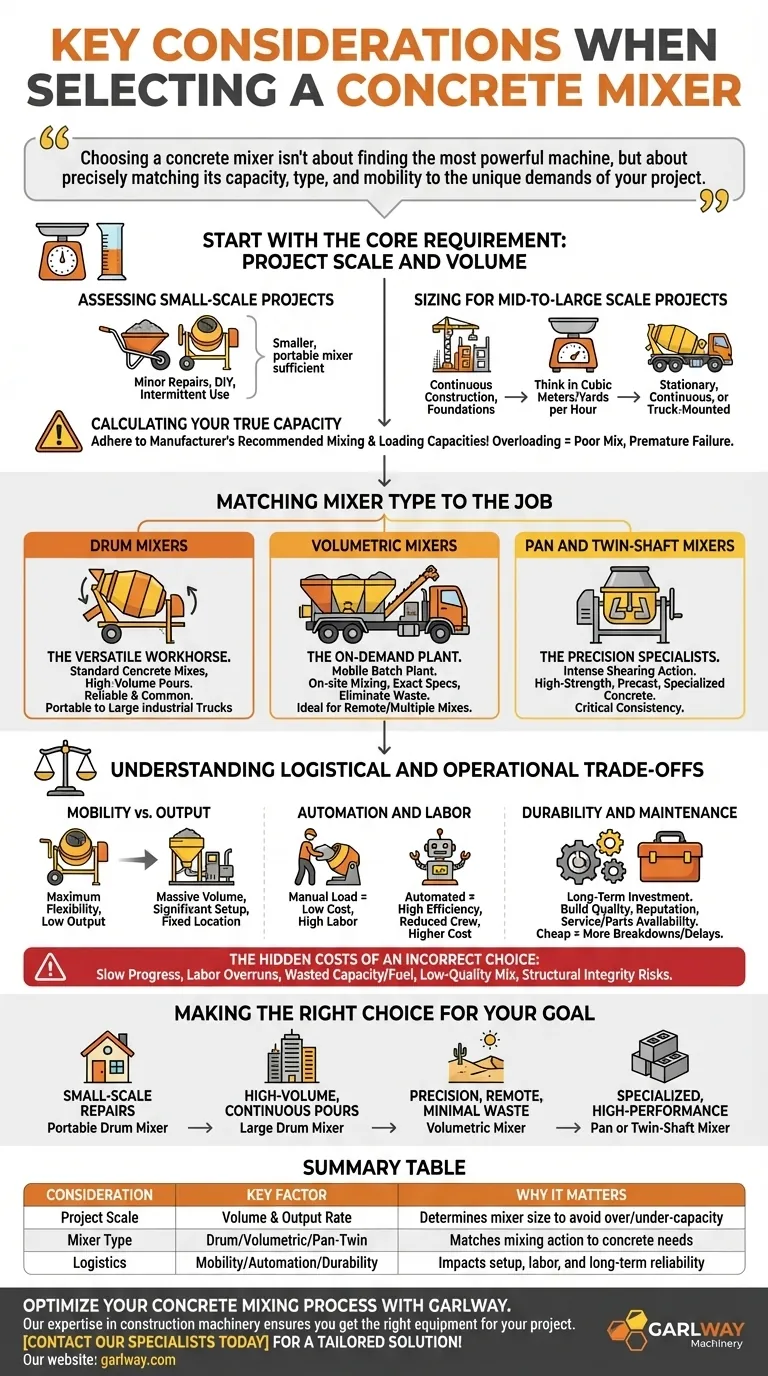Selecting the right concrete mixer is a critical decision that directly impacts project efficiency, material cost, and the final quality of your work. The process involves a systematic evaluation of your project's scale, the required concrete volume and type, and key logistical factors like site accessibility.
Choosing a concrete mixer isn't about finding the most powerful machine, but about precisely matching its capacity, type, and mobility to the unique demands of your project. A mismatch leads directly to wasted time, materials, and capital.

Start with the Core Requirement: Project Scale and Volume
The first step is to accurately define the scope of your work. The amount of concrete you need and the rate at which you need it are the primary drivers of your decision.
Assessing Small-Scale Projects
For minor repairs, residential patios, or DIY tasks, a smaller, portable mixer is typically sufficient. These are designed for intermittent use and handling smaller batches effectively.
Sizing for Mid-to-Large Scale Projects
For commercial foundations, large slabs, or continuous construction work, you must think in terms of output over time (e.g., cubic meters or yards per hour). This requires a stationary, continuous, or large truck-mounted mixer to keep up with the pace of the pour.
Calculating Your True Capacity
Always adhere to the manufacturer's recommended mixing and loading capacities. Overloading a mixer not only produces a poor-quality mix but also puts extreme stress on the motor and frame, leading to premature failure.
Matching Mixer Type to the Job
Different mixers are engineered for different tasks and materials. Understanding the fundamental types is key to selecting the right tool.
Drum Mixers: The Versatile Workhorse
This is the most common type, featuring a rotating drum with internal fins. They are excellent for standard concrete mixes and are available in various sizes, from small portable models to large industrial trucks. They are reliable and well-suited for high-volume pours.
Volumetric Mixers: The On-Demand Plant
A volumetric mixer is essentially a mobile batch plant. It carries sand, stone, cement, and water in separate compartments and mixes them on-site to exact specifications. This is ideal for remote locations, jobs requiring multiple different mix designs, or situations where you want to eliminate waste by producing only what you need.
Pan and Twin-Shaft Mixers: The Precision Specialists
These stationary mixers use paddles that rotate within a fixed pan or trough. They provide a more intense, shearing action, making them necessary for producing high-strength, precast, or specialized concrete where mix consistency and homogeneity are absolutely critical.
Understanding the Logistical and Operational Trade-offs
Beyond raw output, you must consider how the mixer will integrate into your workflow and environment. These factors often represent the true cost of operation.
Mobility vs. Output
Portable mixers offer maximum flexibility for small or scattered job sites but have low output. Large stationary plants deliver massive volume but require significant setup and a fixed location, making them suitable only for the largest projects or precast yards.
Automation and Labor
Consider the level of automation. A simple manual-load mixer has a low upfront cost but requires more labor. A self-loading mixer or one with an automated feeding system costs more initially but can dramatically increase efficiency and reduce crew size.
Durability and Maintenance
A mixer is a long-term investment. Evaluate the build quality, the reputation of the manufacturer, and the availability of service and spare parts. A cheaper machine that breaks down frequently will cost far more in project delays and repairs.
The Hidden Costs of an Incorrect Choice
Choosing a mixer that is too small results in slow progress and costly labor overruns. Choosing one that is too large means paying for capacity and fuel you don't use. An inappropriate mixer type can lead to a low-quality mix, jeopardizing the structural integrity of your work.
Making the Right Choice for Your Goal
Select your equipment based on a clear understanding of your primary objective.
- If your primary focus is small-scale repairs or intermittent use: A portable drum mixer offers the best balance of cost, simplicity, and convenience.
- If your primary focus is high-volume, continuous pours for large projects: A large-capacity drum mixer, whether stationary or truck-mounted, is the industry standard for efficient production.
- If your primary focus is precision, remote work, or minimizing waste: A volumetric mixer provides unparalleled on-demand control and is the most efficient choice.
- If your primary focus is specialized, high-performance concrete (e.g., precast): A pan or twin-shaft mixer is the only way to achieve the required consistency and strength.
By aligning your mixer selection with your project's specific operational needs, you ensure maximum efficiency and a higher quality result.
Summary Table:
| Consideration | Key Factor | Why It Matters |
|---|---|---|
| Project Scale | Volume & Output Rate | Determines mixer size (portable vs. stationary) to avoid over/under-capacity issues. |
| Mixer Type | Drum, Volumetric, or Pan/Twin-Shaft | Matches mixing action to concrete needs (standard, on-demand, or high-precision). |
| Logistics | Mobility, Automation, Durability | Impacts setup time, labor costs, and long-term reliability on your job site. |
Optimize your concrete mixing process with GARLWAY. Our expertise in construction machinery—including durable concrete mixers, batching plants, and winches—ensures you get the right equipment for your project's scale and specifications. Contact our specialists today for a tailored solution that boosts efficiency and cuts costs!
Visual Guide

Related Products
- Ready Mixer Machine for Construction Ready Mix Machinery
- Commercial Construction Mixer Machine for Soil Cement Mixing Concrete
- Auto Concrete Cement Mixer Machine New
- JDC350 Small Cement Concrete Mortar Mixer
- HZS90 Large Multiquip Concrete Mixers for Construction
People Also Ask
- How does the tilting drum mixer's angle affect mixing? Master the 15° Secret for a Perfect Blend
- How do continuous mixers operate? A Guide to High-Volume Concrete Production
- What are the three main types of concrete mixers? Choose the right one for your project's quality, volume, and logistics.
- How do volumetric mixers enable customizable concrete mixes? Achieve On-Demand, Zero-Waste Production
- Why is it important to ensure uniform mixing in a flat mouth mixer truck? Guarantee Concrete Strength & Efficiency
- How does a tilting drum concrete mixer work? Achieve Fast, High-Quality Concrete Pouring
- What types of concrete mixers are there? Find the Perfect Mixer for Your Project's Scale
- What are the common applications of dry concrete mix? Ideal for Small-Scale Projects & Repairs



















